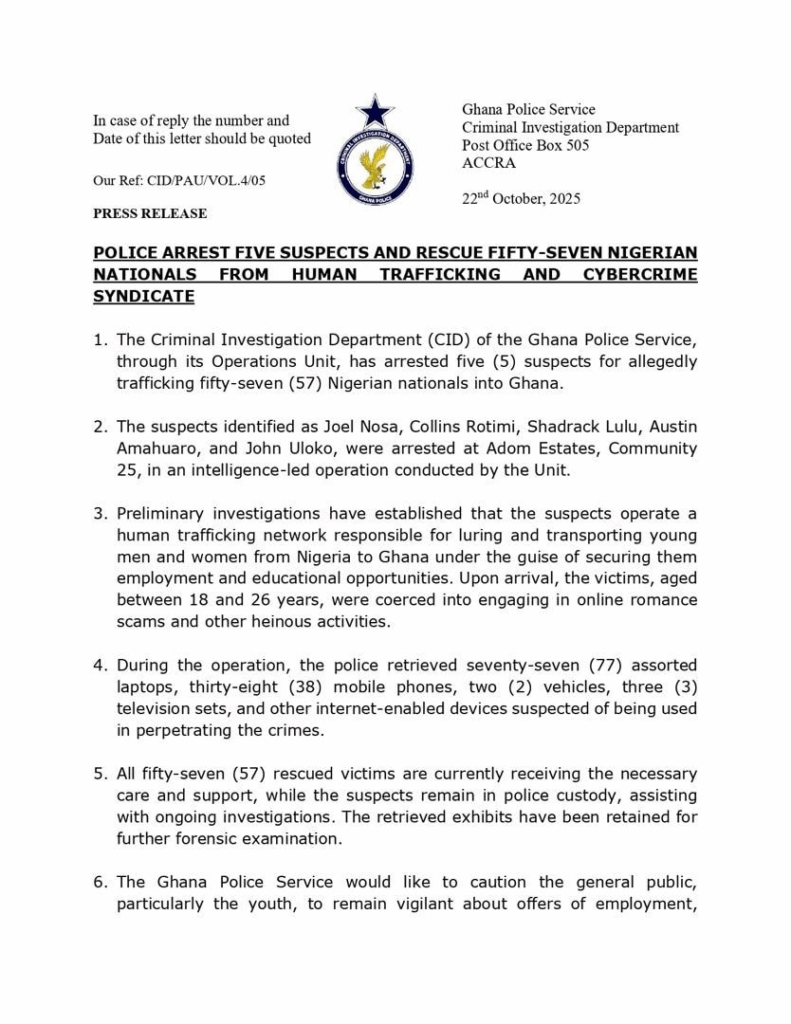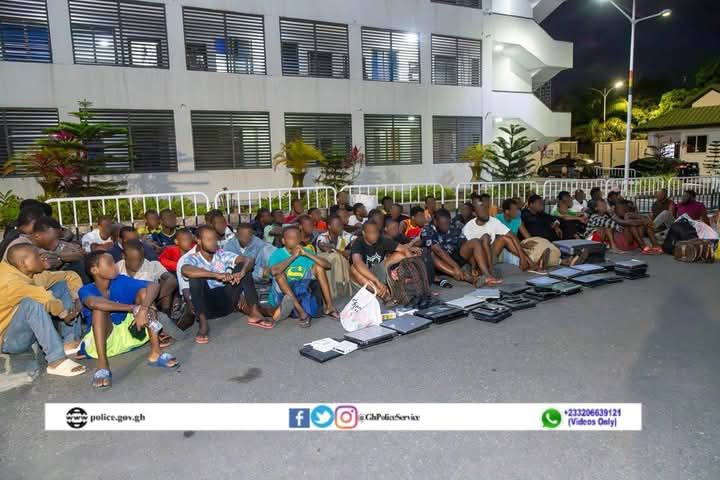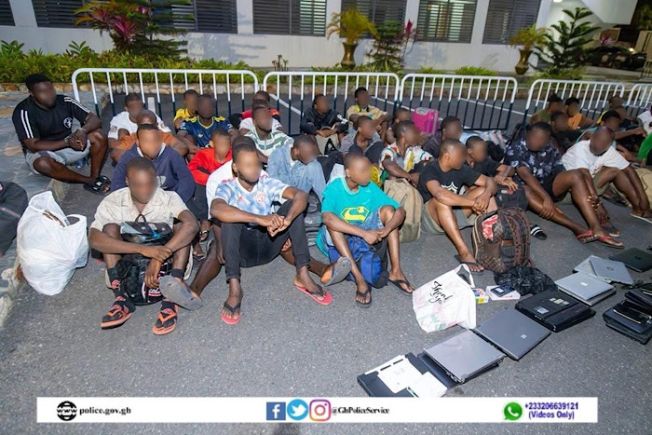The Criminal Investigation Department (CID) of the Ghana Police Service has rescued 57 Nigerian nationals and arrested five suspects believed to be behind a major human trafficking and cybercrime syndicate operating in Community 25, Tema, in the Greater Accra Region.
The coordinated operation, carried out on Wednesday, October 22, 2025, was led by the CID’s Operations Unit following weeks of surveillance and intelligence gathering on the group’s illegal activities.
According to a police statement signed by Chief Inspector Brigitte Babanawo, Public Relations Officer of the CID, the syndicate lured unsuspecting young Nigerians into Ghana with false promises of lucrative jobs and educational opportunities.
Upon arrival, however, the victims — mostly aged between 18 and 26 years — were allegedly held against their will and forced into online scams, including romance fraud and other internet-based crimes.
“The victims were coerced into engaging in online romance scams and other illicit cyber activities,” the police statement explained. “They were made to work long hours under threats and intimidation.”
The police identified the suspects as Joel Nosa, Collins Rotimi, Shadrack Lulu, Austin Amahuaro, and John Uloko, all Nigerian nationals believed to be part of a wider trafficking network operating across West Africa.

During the raid on the syndicate’s base at Adom Estates, investigators seized a significant cache of electronic devices believed to have been used in their criminal activities.
Items retrieved included 77 laptop computers, 38 mobile phones, two vehicles, three television sets, and several internet routers and modems. The CID said all items have been retained for forensic examination to establish their connection to cybercrime operations.
According to law enforcement sources, preliminary digital scans of the seized equipment revealed multiple foreign bank account details, email templates used in scam operations, and chat records linked to victims across Nigeria, Ghana, and other parts of Africa.
The 57 rescued victims are currently in protective custody, receiving medical care, counseling, and psychological support under the supervision of the Human Trafficking Secretariat of the Ministry of Gender, Children and Social Protection.
Social workers have begun profiling the victims in collaboration with the Nigerian High Commission in Accra to facilitate their rehabilitation and safe repatriation.
Police say none of the rescued persons sustained physical injuries, though several are showing signs of trauma due to weeks of confinement and psychological coercion.

Human trafficking and cybercrime have become intertwined criminal activities across West Africa, with Ghana, Nigeria, and Côte d’Ivoire often serving as both transit and destination points.
According to the 2024 U.S. Department of State Trafficking in Persons Report, Ghana remains a “source, transit, and destination country” for men, women, and children subjected to forced labor and sexual exploitation.
The Ghana Police Service has intensified operations against trafficking syndicates, with at least 412 victims rescued and 59 traffickers prosecuted between 2023 and mid-2025, according to data from the Human Trafficking Secretariat.
Many of these cases involve cross-border recruitment through social media platforms such as Facebook, TikTok, and WhatsApp, where traffickers advertise fake job offers in hospitality, technology, or education.
The CID has urged the public, particularly young people seeking employment abroad, to verify all job or travel offers through accredited agencies and avoid deals arranged solely through social media.
“The Police Service remains committed to combating human trafficking, cybercrime, and related offences,” the CID statement said. “We encourage anyone with credible information about such activities to report to the nearest police station or call the emergency lines.”
Officials further noted that victims of trafficking are often trapped by economic hardship, highlighting the need for public education on the dangers of illegal migration and unverified recruitment schemes.
The case underscores Ghana’s growing role as a regional anti-trafficking hub, as security agencies increasingly collaborate with ECOWAS partners and INTERPOL to track transnational criminal networks.
Ghana’s Human Trafficking Act (Act 694) criminalizes all forms of human trafficking and imposes a minimum penalty of five years imprisonment. However, enforcement challenges persist due to limited resources and cross-border complexities.
In recent years, the government has partnered with international organizations such as the International Organization for Migration (IOM) and the United Nations Office on Drugs and Crime (UNODC) to strengthen victim protection, improve digital forensics, and train investigators.

Security analysts say while police raids and arrests are commendable, the long-term solution lies in preventing recruitment in source communities.
Dr. Kwesi Aning, Director of Academic Affairs and Research at the Kofi Annan International Peacekeeping Training Centre (KAIPTC), has previously noted that economic vulnerability and social media manipulation remain the “root drivers” of youth exploitation across West Africa.
He called for regional intelligence sharing, tougher penalties for traffickers, and public awareness campaigns targeting rural and urban youth most at risk of online recruitment scams.
The five arrested suspects are currently in police custody as investigations continue. Prosecutors are preparing charges related to human trafficking, cyber fraud, and money laundering.
If found guilty, they could face up to 25 years imprisonment under Ghanaian law. The CID has also confirmed ongoing efforts to identify potential accomplices, including those believed to have financed or coordinated the operations from outside Ghana.
This latest rescue operation marks one of the largest anti-trafficking interventions by Ghanaian security agencies in 2025, highlighting the country’s intensified efforts to clamp down on cross-border crime.
The case also renews calls for public vigilance, stronger digital regulation, and deeper cooperation among West African states to dismantle criminal networks exploiting young people for profit.
As investigations proceed, the rescue of the 57 victims serves as a reminder of the human cost of cyber-enabled trafficking — a challenge that continues to test Ghana’s commitment to protecting vulnerable populations and safeguarding regional security.
Read also: Akufo-Addo Meets NPP Presidential Aspirants to Strengthen Party Unity Ahead of 2026 Primaries

